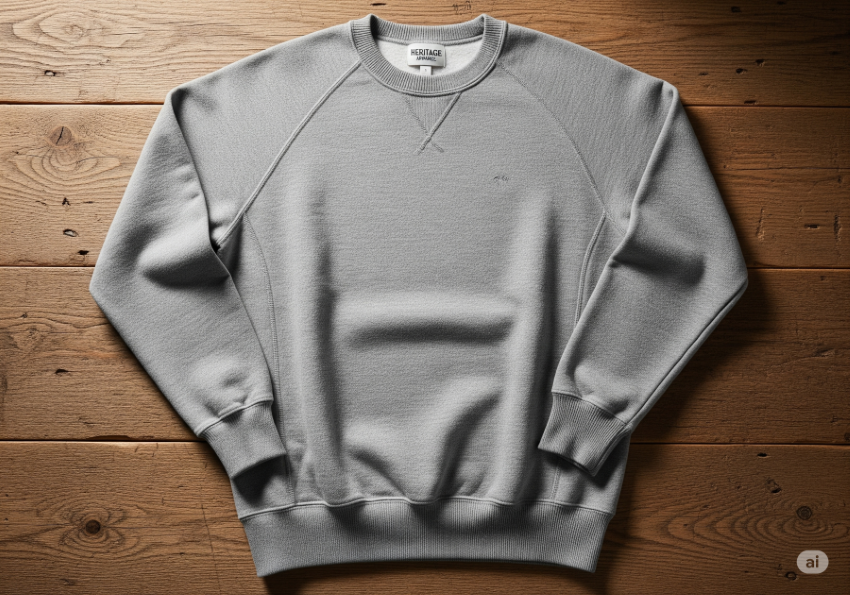The Story Behind the Name and Its Place in Modern Custom Apparel
The humble sweatshirt is a wardrobe staple—comfortable, versatile, and effortlessly cool. But have you ever stopped to wonder why it’s called a sweatshirt in the first place? It’s not the most flattering name, after all.
Let’s dive into the surprisingly sporty roots of the sweatshirt, how the name came about, and why this timeless piece continues to be a favourite across industries—from sports to streetwear to custom-branded uniforms.
The Origins of the Sweatshirt: Born from Sweat
The term “sweatshirt” might sound odd today, but it actually makes perfect sense when you understand its origin. The sweatshirt was invented in the 1920s by Benjamin Russell Jr., a football player at the University of Alabama. Frustrated with the itchy, uncomfortable wool jerseys worn during practice, he suggested a cotton-based alternative to his father, who owned a clothing company.
The result? A soft, comfortable, loose-fitting pullover made from thick cotton fabric—ideal for absorbing sweat during workouts and athletic training.
Hence the name: “sweat” for its function during exertion, and “shirt” as it was a pullover top. What started as athletic wear soon evolved into casual wear, leisurewear, and even branded business apparel.
From the Gym to the Streets: Sweatshirt Evolution
Originally designed for athletes, the sweatshirt has come a long way. By the 1960s and 70s, sweatshirts had made their way into college campuses and urban fashion scenes. The rise of hip-hop culture, skateboarding, and streetwear helped cement the sweatshirt’s iconic status.
Today, it’s not just for working out. Sweatshirts are worn at home, in offices, on construction sites, and even in fashion runways. They’re now available in multiple styles—crewnecks, hooded sweatshirts (aka hoodies), zip-ups, cropped styles, and oversized designs.
Why the Name Still Sticks
Even though most people aren’t sweating in their sweatshirts anymore, the name persists. It’s become so ingrained in fashion language that it’s hard to imagine it being called anything else. Like jeans or sneakers, the sweatshirt is a case where function influenced the name, and the name stuck around long after the original purpose shifted.
Some might even say the name adds a nostalgic, athletic charm—reminding us of simpler times, team sports, and chilly morning jogs.
Modern-Day Use: Sweatshirts in Workwear and Branding
In today’s business world, the sweatshirt is more than a comfy throw-on—it’s a brand-building tool. With businesses increasingly prioritising employee comfort and brand visibility, custom sweatshirts have become an essential part of modern workwear.
From construction crews wearing printed hooded sweatshirts on-site, to tech startups gifting embroidered crewnecks to their teams, the sweatshirt is practical, on-trend, and highly brandable.
That’s where T-shirt Plus comes in.
T-shirt Plus: Custom Sweatshirts and Apparel for Every Need
For Australian businesses looking to level up their custom apparel game, T-shirt Plus is a trusted provider of high-quality, comfortable garments including hoodies, jackets, vests, pants, shorts, workwear, activewear, sportswear, and teamwear. Whether it’s embroidered corporate sweatshirts or digitally printed designs for your brand, T-shirt Plus makes it easy to get started.
What Sets T-shirt Plus Apart?
-
No Minimum Order Quantity (MOQ): Ideal for startups, small teams, and one-off events.
-
Custom Embroidery & Digital Printing: High-quality customisation that brings your logo or message to life.
-
Australia-Wide Shipping: From Sydney to Perth, your gear gets to you fast and hassle-free.
-
Friendly, Local Support: Get advice on products, printing methods, and garment styles that best suit your needs.
Whether you’re outfitting a local sports club, retail staff, tradie crew, or school team, T-shirt Plus offers comfort, durability, and style—all with your branding front and centre.
Choosing the Right Sweatshirt for Your Team or Brand
Not all sweatshirts are created equal. When selecting a sweatshirt for your business or team, consider the following:
1. Fabric & Comfort
Look for breathable cotton blends or fleece-lined interiors for all-day comfort.
2. Style & Fit
Crewneck or hoodie? Classic fit or oversized? The choice depends on your brand personality and team preferences.
3. Customisation Options
Embroidered logos add a premium feel, while digital prints are great for colourful, detailed designs.
4. Durability
Especially for active teams or tradies, reinforced stitching and heavy-duty fabrics can extend the life of your sweatshirts.
Fun Fact: Sweatshirts vs. Jumpers vs. Hoodies
In Australia, the term jumper is often used interchangeably with sweatshirt, but there are slight differences. Technically:
-
Sweatshirt: Cotton-based pullover, typically worn casually.
-
Jumper: Broader term; can include knitted wool garments or sweatshirts.
-
Hoodie: A sweatshirt with a hood, often with a front pocket or zip.
Whatever you call it, one thing’s clear—the sweatshirt is here to stay.
Final Thoughts: More Than Just a Name
So why do we call it a sweatshirt? Because that’s exactly what it was designed for—sweating. But today, this versatile garment has transformed from a sports essential to a customisable canvas for personal expression, branding, and team unity.
Whether you’re launching a merch line, equipping your staff, or just creating a cohesive look for your organisation, custom sweatshirts are a smart and stylish choice.
And with T-shirt Plus, creating branded sweatshirts and workwear in Australia is simple, affordable, and tailored to your vision—no matter your size or style.
